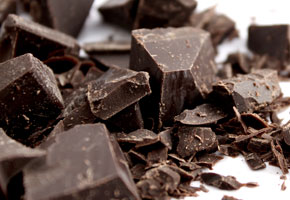
Is Chocolate Really Good For You?
By Sebrina Zerkus Smith | 0 Comments | Posted 07/23/2014
You’ve probably heard experts touting the news that eating chocolate is good for you. But is it true? Before you dive head-first into that box of Wild Oats Organic Double Chocolate Chip Oatmeal cookies (for your health, of course) check out the facts about the chocolate-health connection.
It seems everywhere you look these days, someone is clamoring about the health benefits of chocolate. Even saying that research concludes that eating chocolate each day may cut your risk of heart failure by as much as a third, lower your blood pressure and elevate your HDL levels.
So is chocolate really good for you? An article published in the February 2014 issue of Harvard Women’s Health Watch investigated the chocolate health claims and decided the answer is yes–and no.
Say Yes To Dark Chocolate
According to the Harvard report, cacao seeds (which are roasted and ground to produce cocoa, which is then used in a bazillion tasty, chocolatey ways) are a significant source of plant compounds called flavonoids. These plant compounds have been shown to have beneficial effects on heart disease risks, as well as blood flow to the brain, leading to the idea that eating chocolate, especially dark chocolate which has the highest concentration of flavonoids, will have a positive effect on brain and heart health.
So if you’re looking for something sweet to snack on, dark chocolate is the way to go. Dark chocolate is also high in fiber, iron, magnesium and potassium.
Say No To Calories and Fat
But many studies on the health benefits of chocolate based results on the individuals’ consumption of a dose equal to 400mg of flavonoids per day. That’s about 8 dark chocolate bars a week, or 30 milk chocolate bars. Delicious, yes. But could your waistline take that hit? I know mine couldn’t.
The results of the chocolate studies are so dubious, in fact, that the Association Of Health Care Journalists (AHCJ) is cautioning it’s members to be more circumspect in it’s reporting of the findings.
Case in point: A much ballyhooed Swedish study concluding that eating dark chocolate reduced the risk of stroke. The study followed 37,000 men who reported eating chocolate at least once per week. But many of the study’s findings were based on self-reporting of the amount of chocolate consumed by participants in the study. This, according to AHCJ, is problematic because of possible bias on the part of responders. That is to say that study participants may have overestimated the amount of chocolate they had actually eaten. Also, the conclusion that stroke numbers were affected by chocolate consumption may have failed to compensate adequately for other factors–such as age, consumption of red meat and red wine, fruits and vegetables, activity level and lifestyle.
So it’s a mixed bag. Most things in life are, unfortunately.
But if you want to reap some of the benefits of the cacao seed, and still maintain your waistline, stick to quality dark chocolate with at least 70% cacao, and limit your servings.
Or you could try a concentrated cacao supplement like CocoaVia. Look for one that contains at least 250mg of cacao flavonoids per serving. And you’re right, supplements will only give you the health benefits of the cacao seed–not that wonderful feeling of chocolate bliss. Save that for the delicious Wild Woman Dark Chocolate Bar you get on your birthday each year.


 Contact us
Contact us



























